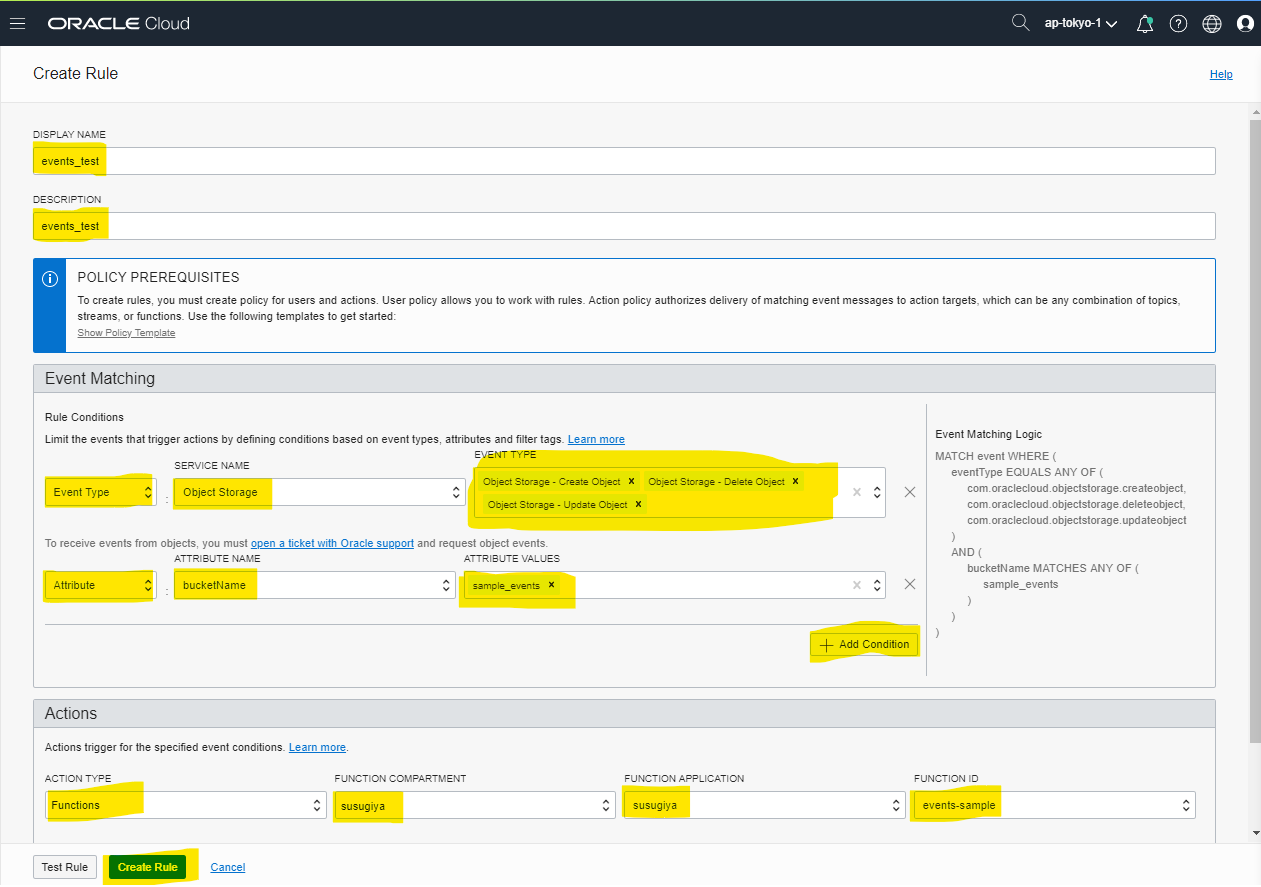はじめに
Oracle Cloud Infrastructure(以下OCI)では、サーバレスサービス群でコアの部分である FaaS サービスの Oracle Function がリリースされました。
また、OCI 上のリソースでの各種イベントをトリガーにして、様々なサービスを呼び出す Events サービスも一緒にリリースされています。
Events のトリガーは、現時点で 2種類のサービスに対応しています。
- Object Storage
- Autonomous DB
また、Events のアクションは、現時点で3種類のサービスに対応しています。
- Functions
- Streaming
- Notifications
今回は、Object Storage 上で Object の作成・更新・削除をイベントをトリガーにして、Oracle Functions を呼び出したときにどのようなパラメータを取得できるか確認をします。
Functions の作成
まず、Functions を動かす準備が出来ていない場合は、以下の Doucment や Quick Start Guide を参考にして、事前準備をします。
Preparing for Oracle Functions
https://docs.cloud.oracle.com/iaas/Content/Functions/Concepts/functionsprerequisites.htm
Quick Start Guide
https://www.oracle.com/webfolder/technetwork/tutorials/infographics/oci_faas_gettingstarted_quickview/functions_quickview_top/functions_quickview/index.html
Functions を動かす準備が出来たあと、Events の入力を受け取りJSON として output するためのコードをプログラミングします。
GitHub にアップロードしているものと同一です
https://github.com/Sugi275/oci-go-fdk-events-sample/blob/master/func.go
package main
import (
"context"
"encoding/json"
"fmt"
"io"
"time"
_ "os"
fdk "github.com/fnproject/fdk-go"
)
func main() {
fdk.Handle(fdk.HandlerFunc(myHandler))
// ------- local development ---------
// reader := os.Stdin
// writer := os.Stdout
// myHandler(context.TODO(), reader, writer)
}
//EventsInput test
type EventsInput struct {
CloudEventsVersion string `json:"cloudEventsVersion"`
EventID string `json:"eventID"`
EventType string `json:"eventType"`
Source string `json:"source"`
EventTypeVersion string `json:"eventTypeVersion"`
EventTime time.Time `json:"eventTime"`
SchemaURL interface{} `json:"schemaURL"`
ContentType string `json:"contentType"`
Extensions struct {
CompartmentID string `json:"compartmentId"`
} `json:"extensions"`
Data struct {
CompartmentID string `json:"compartmentId"`
CompartmentName string `json:"compartmentName"`
ResourceName string `json:"resourceName"`
ResourceID string `json:"resourceId"`
AvailabilityDomain string `json:"availabilityDomain"`
FreeFormTags struct {
Department string `json:"Department"`
} `json:"freeFormTags"`
DefinedTags struct {
Operations struct {
CostCenter string `json:"CostCenter"`
} `json:"Operations"`
} `json:"definedTags"`
AdditionalDetails struct {
Namespace string `json:"namespace"`
PublicAccessType string `json:"publicAccessType"`
ETag string `json:"eTag"`
} `json:"additionalDetails"`
} `json:"data"`
}
func myHandler(ctx context.Context, in io.Reader, out io.Writer) {
input := &EventsInput{}
json.NewDecoder(in).Decode(input)
outputJSON, _ := json.Marshal(&input)
fmt.Println(string(outputJSON))
out.Write([]byte("text message wo kaku"))
}
1個目のポイントは、14行目の次の箇所です。この指定により、myHandler が Oracle Functions の関数として呼び出されます
fdk.Handle(fdk.HandlerFunc(myHandler))
myHandler の定義を見ていきます。引数の2つ目の in io.Reader に、Events から入力されたパラメータ群が格納されています。
in を EventsInput structとして定義した JSONを作成して、出力します。
Oracle Functions のなかで fmt.Println を行うと、Functions の logging 先に出力されます。
現時点でlogging は、Object Storage と syslog の二種類がありますが、syglog を選択して Papertrail などを利用すると楽で良いでしょう。
func myHandler(ctx context.Context, in io.Reader, out io.Writer) {
input := &EventsInput{}
json.NewDecoder(in).Decode(input)
outputJSON, _ := json.Marshal(&input)
fmt.Println(string(outputJSON))
out.Write([]byte("text message wo kaku"))
}
上記作成後、deploy を行います。以下はdeployのコマンド例です。環境にあわせて適宜変更してください。
fn --verbose deploy --app susugiya
なお、function の名前は events-sample としています
> cat func.yaml
schema_version: 20180708
name: events-sample
version: 0.0.7
runtime: go
entrypoint: ./func
Object Storage の Bucket を作成
Events の対象とするための Object Storage Bucket を作成します。
OCIのメニューから、Object Storage を開き、Create Bucket を選択します。
以下のパラメータを入力し、Create を行います。
- name : sample_events
Events の設定
Events サービスの設定を行い、Object Storage のイベントをトリガーにして、Oracle Functions を呼び出します。
OCIのメニューから、Application Integration > Events Serviceを選択します。
Create Rule を押します。
以下のパラメータを入力して、Create Rule を押します。
- DISPLAY NAME : events_test
- DESCRIPTION : events_test
- Events Matching : 下の画像を参考にして設定する
- EVENT TYPE に Object の Create, Delete, Update の3種類を入力
- Attribute に、
bucketNameをsample_eventsと手入力することで、特定のバケットに制限
- Actions : Function の 名前を指定
Bucket にファイルをアップロード
作成した Bucket sample_events にファイルをアップロードすると、Events がトリガーして、Function が起動します。
Function に設定した logging の先を確認すると、Events から入力されたパラメータを確認することが出来ます。
Create Object
-
"eventType": "com.oraclecloud.objectstorage.createobject"となっています -
"resourceName": "3eventsample.txt",となっており、Bucket にアップロードしたファイル名が含まれています -
パラメータに、Bucket 名やOCIDが含まれていない。Function側でBucket名が必要な場合は環境変数設定などで工夫が必要そう
{
"cloudEventsVersion": "0.1",
"eventID": "51827a0e-7d03-4d6a-b274-fb51e2b0b764",
"eventType": "com.oraclecloud.objectstorage.createobject", <======== Event の Type
"source": "objectstorage",
"eventTypeVersion": "1.0",
"eventTime": "2019-08-25T09:51:55Z",
"schemaURL": null,
"contentType": "application/json",
"extensions": {
"compartmentId": "ocid1.compartment.oc1..secret"
},
"data": {
"compartmentId": "ocid1.compartment.oc1..secret",
"compartmentName": "susugiya",
"resourceName": "3eventsample.txt", <======== Object の名前
"resourceId": "",
"availabilityDomain": "",
"freeFormTags": {
"Department": ""
},
"definedTags": {
"Operations": {
"CostCenter": ""
}
},
"additionalDetails": {
"namespace": "tenancyname",
"publicAccessType": "",
"eTag": "498e8542-2e9b-4684-87e2-f75ab90354b9"
}
}
}
Update Object
"eventType": "com.oraclecloud.objectstorage.updateobject" となっています。
{
"cloudEventsVersion": "0.1",
"eventID": "494ec7c7-9b72-4fed-b81f-f857b5be3616",
"eventType": "com.oraclecloud.objectstorage.updateobject",
"source": "objectstorage",
"eventTypeVersion": "1.0",
"eventTime": "2019-08-25T11:21:06Z",
"schemaURL": null,
"contentType": "application/json",
"extensions": {
"compartmentId": "ocid1.compartment.oc1..secret"
},
"data": {
"compartmentId": "ocid1.compartment.oc1..secret",
"compartmentName": "susugiya",
"resourceName": "eventsample.txt",
"resourceId": "",
"availabilityDomain": "",
"freeFormTags": {
"Department": ""
},
"definedTags": {
"Operations": {
"CostCenter": ""
}
},
"additionalDetails": {
"namespace": "tenancyname",
"publicAccessType": "",
"eTag": "6439bd89-fdc2-4e1b-90af-12643456bfee"
}
}
}
Delete Object
"eventType": "com.oraclecloud.objectstorage.deleteobject" となっています。
{
"cloudEventsVersion": "0.1",
"eventID": "355b29aa-883c-42ea-9fea-28cdb153a4d0",
"eventType": "com.oraclecloud.objectstorage.deleteobject",
"source": "objectstorage",
"eventTypeVersion": "1.0",
"eventTime": "2019-08-25T11:24:59Z",
"schemaURL": null,
"contentType": "application/json",
"extensions": {
"compartmentId": "ocid1.compartment.oc1..secret"
},
"data": {
"compartmentId": "ocid1.compartment.oc1..secret",
"compartmentName": "susugiya",
"resourceName": "4eventsample.txt",
"resourceId": "",
"availabilityDomain": "",
"freeFormTags": {
"Department": ""
},
"definedTags": {
"Operations": {
"CostCenter": ""
}
},
"additionalDetails": {
"namespace": "tenancyname",
"publicAccessType": "",
"eTag": ""
}
}
}
参考URL
Contents of an Event Message
https://docs.cloud.oracle.com/iaas/Content/Events/Reference/eventenvelopereference.htm
